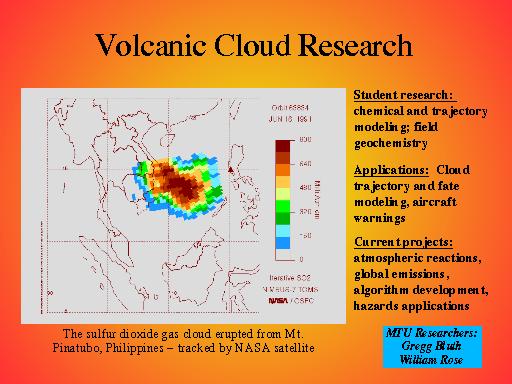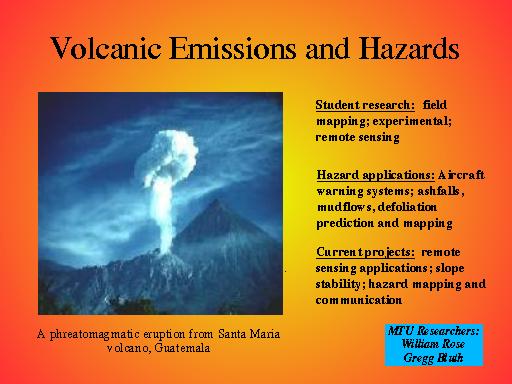Information for Prospective
Students

WANTED: Student Researchers!!!
I'm looking for diverse, motivated students to work on a
variety of graduate and undergraduate research projects. For some past and
current project examples, see the "Students
Advising" and "Research"
pages.
TYPES OF STUDENTS
I enjoy working with a variety of students, both geoscience
majors and others such as Civil and Environmental Engineering, Computer
Sciences and Physics. Worried because you have no remote sensing background?
If you're willing to learn, we're willing to teach you - we have some
excellent courses that you can take while doing research. I have sponsored
projects that are field-based as well as computer intensive.

LEVELS OF STUDENTS
Undergraduates: We have a lot of flexibility
here, and past students have worked in the field (for example monitoring
stream chemistry), the lab (chemical experiments and measurements) and in
remote sensing (both computer and field)
I often pair undergraduate students with graduate students,
to help them get involved with an active research project. There are also
opportunities for undergraduates to get their own funding (see below) for
travel, meetings and field work.
Graduates, M.S.: These projects depend
somewhat on funding, but additional support is available from departmental
Teaching Assistantships, which allows a pretty wide range of research. In
these my goal is for you to learn how to conduct a research project, how to
organize and analyze your results, and how to present your results to a broad
audience. My goal is to get you to at least one outside conference per year,
in addition to a number of local (MTU) conferences. Many of my M.S. students
have done internships as well, such as NASA or the USGS. This is a great
experience and I encourage this.
We have a new program , the Master’s
International program with the U.S. Peace Corp. This is a great way to get field and
practical experience in Central America while earning your M.S.
Graduates, Ph.D.: PhD projects are primarily
tied to ongoing research projects, but as a Doctoral student I would expect
you to generate your own unique research focus. So while you might start off
on an existing project, it often happens that you will come up with your own
directions for research. As PhD students, I expect that you will learn how to
tackle all kinds of projects, learn how to teach yourself what you need to do
good research, and achieve confidence in your abilities by practice: you will
meet lots of different researchers, and will most likely do some kind of
off-campus internship (past ones have been to NASA Goddard and Alaska's
Volcano Observatory) to gain experience.
I am also a part of the Computer Science and Engineering
group, which is designed for students who are highly skilled in computer
sciences with interests in science applications. This is a valuable career
path for those who want to merge cutting-edge technical and scientific interests.
SOURCES OF FUNDING
This is not meant to be a
comprehensive list. These are just some of the common fellowships and aid
that many of our students have been able to get.
|
Funding
Agency
|
Ph.D.
|
Master's
|
Undergrad
|
|
National
|
|
|
|
|
National
Science Foundation Graduate Research Fellowship
develop your own research project; proposals due Nov. 7
(http://www.orau.org/nsf/nsffel.htm)
2003 Guidelines (http://www.nsf.gov/cgi-bin/getpub?nsf02150)
|
stipend + tuition
|
|
|
|
National
Aeronautic and Space Administration
many
different fellowships/internships; proposals due Feb. 1
(http://ehb2.gsfc.nasa.gov/edcats/2000/nep/programs/)
|
stipend + tuition
|
check the web site
|
check the web site
|
|
National
Physical Science Consortium
develop
your own research project; proposals due Aug. 1 - Nov. 15
(http://www.npsc.org)
|
stipend + tuition
|
|
|
|
Sigma
Xi, the Scientific Research Society
(http://www.sigmaxi.org);
proposals due Mar. 15 and Oct. 15
|
up to 1000
|
up to 1000
|
|
|
|
|
|
|
|
State
|
|
|
|
|
Michigan
Space Grant Consortium
to
assist students in research support
(http://www.engin.umich.edu/dept/aero/msgc/);
proposals due Dec. 2
|
5000
|
5000
|
2500
|
|
|
|
|
|
|
Michigan Tech
|
|
|
|
|
MTU
Challenge Fellowships
these are linked to existing research grants, but the research
for these is not specified - check with potential advisors
|
stipend + tuition
|
NA
|
NA
|
|
Research
Assistantships
these are part of existing research projects - check
with potential advisors
|
stipend + tuition
|
stipend + tuition
|
NA
|
|
Teaching
Assistantships
these typically involve laboratory teaching, grading,
and lab preparation.
|
rarely offered
|
stipend + tuition
|
NA
|
|
MTU Graduate School Opportunities
(http://www.mtu.edu/grad/)
Look under the "Fellowships" link
|
|
|
|
|
National (general)
This web site links to most Federal funding
opportunities
(http://www.doe.mtu.edu/funding.html)
|
|
|
|
|
|
|
|
|
For more information, you can contact me by email.
|

